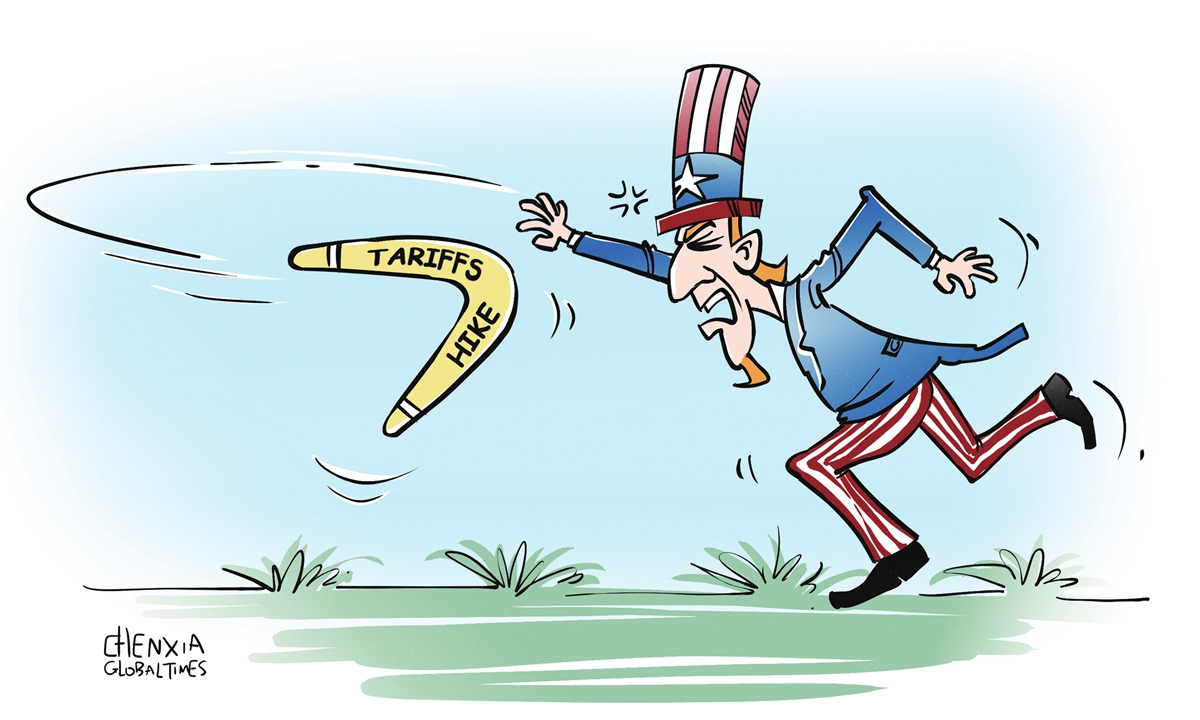
Illustration: Chen Xia/GT
China on Saturday expressed strong dissatisfaction and opposition to US' finalized steep tariff hikes on certain Chinese products,
mk calling the US compounding mistakes and urging it to correct wrongdoings. It also vowed to take necessary measures to protect Chinese firms' interests.
The US announced on Friday that it has finalized sharp tariff hikes on certain Chinese products following a four-year review to "strengthen protections for strategic industries," despite opposition from various sectors. Analysts warned that this self-willed tariff hike will ultimately harm US industries in the long run.
"China is strongly dissatisfied with and firmly opposed to the tariff increase on certain Chinese products," a spokesperson for the Ministry of Commerce of China (MOFCOM) said on Saturday, noting that the US should immediately correct its wrongdoings and cancel all additional tariffs on Chinese products. China will take necessary measures to firmly safeguard the interests of Chinese enterprises.
China has repeatedly lodged serious representations to the US side on the Section 301 tariffs, and the WTO has already ruled that these tariffs violate its rules. Instead of addressing this, the US has further increased tariffs on Chinese products, compounding its mistakes, the spokesperson noted.
"The US Section 301 tariff measure is a typical unilateralism and protectionism. It not only seriously undermines the international trade order and the security and stability of global industrial chains and supply chains, but also fails to improve the US' trade deficit and industrial competitiveness. It also pushes up the prices of US imports, and the costs are ultimately borne by US companies and consumers," the spokesperson noted.
The tariff increase package under the Section 301 investigation on Chinese products included a 100 percent tariff on electric vehicles (EVs), a 50 percent tariff on photovoltaic cells, as well as a 25 percent tariff on EV batteries, ship-to-shore cranes, steel and aluminum products, beginning from September 27, according to a notice released by US Trade Representative's Office (USTR) on Friday.
A 50 percent duty on Chinese semiconductors is due to start in 2025.
The tariff increase decision leaves the top tariff increases announced by US President Joe Biden in May largely unchanged.
The spokesperson cited a report on WTO compliance by the US published by the MOFCOM on Thursday, which criticized Washington for undermining the multilateral trading system, engaging in unilateral trade bullying, applying double standards in industrial policy, and disrupting the global industrial and supply chains by politicization and weaponization of economic and trade issues, willfully wielding the "tariff baton" under the guise of "de-risking."
During a recent business visit by a Chinese delegation to the US, business communities from both countries called for upholding market principles and the spirit of contracts, opposing trade protectionism, and safeguarding the interests of enterprises on both sides. They also stressed the importance of maintaining the security, stability, and smooth flow of global industrial and supply chains, a spokesperson for the China Council for the Promotion of International Trade, China's trade promotion agency, said on Saturday, responding to the US finalized tariff hikes.
Back in May, US ports and terminal operators pushed back against the Biden administration's proposed 25-percent tariff on ship-to-shore cranes manufactured in China citing the added cost pressures the gateways would incur that could exceed $130 million, media reported.
The American Association of Port Authorities (AAPA) in July urged the USTR office to reverse the decision to impose a 25 percent tariff on Chinese-built ship-to-shore cranes.
"Simply put, AAPA is confident that the tariff, if imposed, will not meet its stated objectives," said Cary Davis, AAPA's President and CEO, as posted on AAPA's website. "Instead, it will only result in negative outcomes, including grave harm to port efficiency and capacity, strained supply chains, increased consumer prices, and a weaker US economy."
"This is not about economics. From a trade perspective, there is no reason for the US to raise tariffs. The decision was made out of a generalized concept of 'national security.' This is purely a political act," He Weiwen, a senior fellow from the Center for China and Globalization, told the Global Times on Saturday.
It is not just American industries that have been opposing the tariffs. An International Monetary Fund (IMF) spokesperson criticized the move in May, saying it "can distort trade and investment, and fragment supply chains."
Back in July, the US postponed the implementation of increased tariffs on Chinese imports, originally set to take effect on August 1. Analysts pointed out that such a delay may be due to concerns among US businesses from various industries, which voiced strong opposition to the initial announcement of the tariff hikes on certain Chinese imports.
A spokesperson for MOFCOM said on September 5 that the Office of the USTR previously sought public comments regarding its tariffs review results, and most opinions were against imposing tariffs or applying for an expansion of tariff exemption, which demonstrates that the practice of the US is not well-received.
Extra tariffs are protectionist measures that are harmful to trade. They will affect American companies related to these products, as well as global companies in the supply chain of these products, Li Yong, a senior research fellow at the China Association of International Trade, told the Global Times.
"The US approach is bound to be opposed by industries because when the US imposes tariffs, it is ultimately its consumers who bear the costs," said Li.
Analysts also emphasized that it would be difficult for the US to find substitutes for some Chinese products in the short term, or if possible, only at a significantly higher cost.
"The US approach is bound to be opposed by industries because when the US imposes tariffs, it is ultimately its consumers who bear the costs," said Li.
Analysts also emphasized that it would be difficult for the US to find substitutes for some Chinese products in the short term, or if possible, only at a significantly higher cost.

